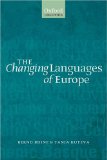The Changing Languages of Europe, Heine and Kuteva 10th of August, 2008 POST·MERIDIEM 01:25
The Changing Languages of Europe, Bernd Heine & Tania Kuteva, Oxford University Press, 2006. On the recommendation of Christopher Culver, I was interested in whether this book goes into specific Sprachbund relationships between Spanish and English—I am constantly finding that English as a first language is a distinct advantage when learning Spanish, compared to my German classmates, and even ignoring the huge overlap in vocabulary. Things like the parallels betwen «estoy hablando» and ‘I am speaking,’ or between «he comido» and ‘I have eaten’, where the German and French [exact] equivalents are minority usages and differ significantly in their structures. (« Je suis en train de parler », « j’ai déjà mangé », „ich bin am Reden“ (which is regarded as colloquial in some texts), „ich habe schon gegessen.“) In that languagehat thread, I remarked that the chronology for the disappearance of the perfect with be in English (cf. “Joy to the world, the Lord is come”) paralleled that in Spanish; German and French have retained their perfects with be without any sign of them disappearing in that time, and I wondered if there had been any work done on Sprachbund phenomena in the two, on the evolution of two geographically close languages (certainly in the New World, if not in Europe) in the same direction.
Now, this book doesn’t deal with that specific pair at all. It turns out to deal with a collection of phenomena in the European languages that have reached their fullest extent in English, French, German, Italian, Iberian Romance, and the Balkan Sprachbund, and documents the historical and modern spread of these phenomena. It makes a good case that this collection of phenomena exists, and was motivated by areal contact; it is well-researched, it cites papers on Irish and on Irish English that I was surprised existed, it goes into the influence of European languages on non-European languages outside of Europe, and in general, I’m glad I read it.
For anyone interested in questions of epistemology, though, it’s a diverting case study. If you read the book with an informed mind, it articulates things that add to the sum of human knowledge and motivates those things well. But there’s almost nothing falsifiable in it, in Popper’s sense. I suppose the same is true of much of historical, comparative linguistics, but I hadn’t read recent theoretical work that was as example-filled and as solid as this is in a long time, so I suppose it wasn’t at the back of my mind when I read up on Popper.
Word of the day: amenazar, Spanish for to threaten, to menace.
[No extant comments for this entry.]
Comments are currently disabled.
